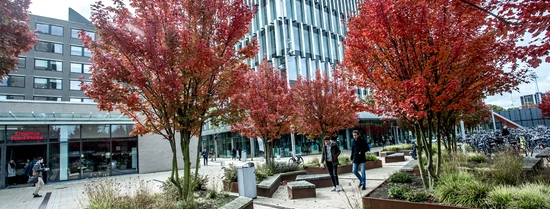Thanks to the new Dutch law Wet Invoering Extra Geboorteverlof (WIEG), fathers in the Netherlands have the possibility to take five extra weeks of paternity leave. They will then receive 70 per cent of their wages. That sounds appealing, but for some families, taking additional paternity leave proves financially unfeasible. And that is where the policy falls short, believes Professor of Family Sociology Renske Keizer of Erasmus University Rotterdam. Keizer investigates the role that family plays in the transmission of social inequality. The results of Keizer's research team contributed to the creation of the WIEG. Still, as far as Keizer is concerned, the law may go one step further to reduce inequality.
As a father, you receive 70 per cent of your regular income during your supplemental paternity leave. A nice arrangement? Keizer: "Yes. Don't get me wrong: I think the new law is great progress because we were the worst off in Europe with our old leave arrangements. Since the WIEG, I have received personal reactions from people I don't know, who thank me because these five weeks have given them time to get used to the new family composition. I am proud that our research has made a tangible contribution to improving family policies!"
Difficulty with 70 per cent
Still, Keizer has difficulty with the 70 per cent. "I said before the introduction that it is better to make it 100 per cent. In other words, a full compensation, up to a certain maximum income. Because recent research showed that the 70 per cent rule encourages inequality. Families with a relatively high income take additional leave significantly more often than families with a relatively low income." According to Keizer, that can never be the law's intention, so her argument is: make that 70 per cent 100.
Family and social inequality
The fact that social inequality is difficult to eradicate, according to Keizer, is because often the factors that play a role in shaping inequality are intertwined. "It's a complex issue, in which family is one of those factors. If you can barely make ends meet on the income you get, it affects the choices you make. To stay with paternity leave, as a father, will you take advantage of extra paternity leave if you're struggling to make ends meet? After all, you'll have to miss 30 per cent of your income..." To reduce social inequality, Keizer, as a sociologist, prefers to push the buttons that affect society as a whole. She believes that institutions in the Netherlands have an important task in this: they can reduce inequality. Keizer: "But when we look at these institutions, the educational system for example, , from the perspective of social inequality, I have major doubts about how we give school advice, the high threshold to be able to move to a different school level and the loan system."
Master's in Social Inequalities
Equal opportunities for all. Keizer also took it as a starting point when she set up the Master Social Inequalities. Students are not selected on references or experience abroad. Keizer asks them to write a motivation letter. In it, she wants to see the drive behind why the student wants to do this particular master's. This results in beautiful and sometimes very personal stories. The master's is in its fourth year, and the number of applications continues to rise every year. But Keizer deliberately does not want the group to be too large. "For me, that is essential in a master's on social inequality. I stand for a safe learning environment for my students. I can best guarantee that if the group remains small and manageable. In such an environment, students can get to know each other personally. Our students come from all over the world. That diversity alone is extremely informative and inspiring . That's what I like about the Social Inequalities master's: whether you're from the Netherlands, Italy, Canada, Chile or Iran, we all want to learn about and contribute to reducing social inequality."
Inter- and transdisciplinary approach
From her own educational background, Keizer is a strong advocate of an interdisciplinary approach. Keizer: "In my career, I have learned to look at current issues from different disciplines. I wanted to know more about differences in the roles that fathers play in raising children, depending on their socioeconomic status. And I wanted to explore how differences in these backgrounds affect children's developmental opportunities. Suppose you want to get as complete a picture of that as possible. In that case, it helps to walk around it, as it were, and look at it through the lenses of pedagogy, developmental psychology, economics, policy and sociology."
In addition to the interdisciplinary approach, Keizer also sees great benefits from transdisciplinary work. "With this approach, we gather knowledge from all types of stakeholders with respect to a specific societal issue. Think citizens, professionals, governments, companies, scientists..." The advantage of a transdisciplinary approach is that all stakeholders are involved from the start. They, therefore, actively contribute to the solution that is put forward. Thus, according to Keizer, it becomes not only a solution for the citizens but also with and by the citizens. This can eliminate mistrust in the proposed solution. Transdisciplinary work also increases the likelihood that policymakers will implement insights that have emerged from the research into policy. After all, they, too, have been involved from the start. Keizer applies this way of working at the Child Poverty Consortium and at SPRING, a consortium dedicated to improving health and well-being in Rotterdam South. Keizer is the academic lead of SPRING together with Machiel van Dorst (TU Delft).
- Professor

